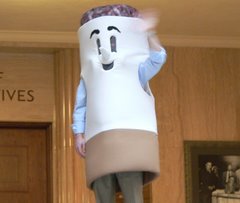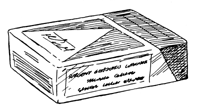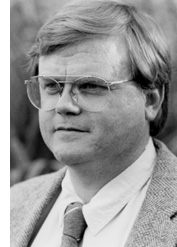Mr. Butts Happy About Defeating Oregon Cigarette Tax
Submitted by Anne Landman on


Submitted by Anne Landman on

Submitted by Diane Farsetta on
 In the 1950s, with the link between cigarette smoking and lung cancer becoming well established, the tobacco industry was in crisis.
In the 1950s, with the link between cigarette smoking and lung cancer becoming well established, the tobacco industry was in crisis.
Sharon Eubanks, the lead attorney in the U.S. Department of Justice (DOJ) case against tobacco companies, recently told the [http://www.washingtonpost.com/wp-dyn/content/article/2007/03/21/AR2007032102713.html Washington Post] that Bush appointees at DOJ pressured her to weaken the government's case against the tobacco companies. The Bush administration has been linked to political rigging of judicial matters recently with the firing of the eight U.S. Attorneys, but while these activities are in the headlines today, it's not the first time. A February 15, 2000 [http://query.nytimes.com/gst/fullpage.html?res=9D00E5DD1531F936A25751C0A9669C8B63&sec=&spon=&pagewanted=print New York Times] article shows that [[George Walker Bush|President Bush]]'s longtime political advisor [[Karl Rove]] (now a senior advisor in the White House) interfered with Texas Attorney General Dan Morales' plans to bring a lawsuit against the major American tobacco companies to recoup state Medicaid funds spent treating sick smokers. Rove helped draft a 1996 push poll aimed at maligning Morales in an attempt to pressure Morales not to file the suit. The push poll was financed by tobacco companies.
 I've been asked to deliver testimony this Wednesday before the Committee on Science and Technology of the U.S. House of Representatives, which is holding a hearing titled "Shaping the Message, Distorting the Science: Media Strategies to Influence Science Policy."
I've been asked to deliver testimony this Wednesday before the Committee on Science and Technology of the U.S. House of Representatives, which is holding a hearing titled "Shaping the Message, Distorting the Science: Media Strategies to Influence Science Policy."
Things are looking grimmer and grimmer for U.S. Attorney General Alberto Gonzales these days. The scandal involving the firing of 8 U.S. attorneys has led to accusations that Gonzales runs the United States Department of Justice (DOJ) to suit the Bush Administration's right wing political ideology instead of to protect the interest of U.S. citizens. Now Sharon Eubanks, the lead attorney in DOJ's racketeering case against the major American tobacco companies, has emerged from her silence and confirmed suspicions of the extent to which politics is running DOJ instead of public interest. Eubanks told the [http://www.washingtonpost.com/wp-dyn/content/article/2007/03/21/AR2007032102713.html Washington Post] that Bush administration political appointees within DOJ repeatedly ordered her to take steps to weaken the government's case against the industry. Eubanks says she was ordered to tell key witnesses change their testimony, was forced to ditch her own closing remarks and made to read closing arguments that her superiors had written for her, and that the DOJ team was told to greatly scale back its requests for remedies against the tobacco companies. Of course, high-ranking Justice Department officials claimed at the time that there was no political meddling in the case, but tobacco control people following the case knew differently. Now Ms. Eubanks has confirmed what we knew all along.
A 23-page, formerly "privileged and confidential" company [http://legacy.library.ucsf.edu/tid/lgs32a00 discussion document] outlines [[Philip Morris]]' thinking behind its 180-degree turn from strongly opposing U.S. Food and Drug Administration (FDA) of cigarettes to in fact driving such regulation. It clues us in to the company's logic in proceeding down this path and what the company hopes for and fears most in FDA regulation. It was written by Mark Berlind, who was Assistant General Counsel of Philip Morris Worldwide Regulatory Affairs in 1998.
Berlind recaps PM's history of opposing FDA regulation and recommends that PM USA advocate for regulation instead as a way to maintain the status quo, or "perpetuate the existing framework's philosophy that adults continue to be permitted to assume" the inherent risks of cigarette smoking. Berlind supported the:
Submitted by Anne Landman on
The American Heart Association (AHA) is once again partnering with the Rite Aid Drug Store chain to promote its "Go Red for Women" campaign, aimed at increasing public awareness of heart disease in women.
On February 9, 2007 the University of Virginia [http://www.virginia.edu/uvatoday/newsRelease.php?id=1469http://www.virginia.edu/uvatoday/newsRelease.php?id=1469# announced] its acceptance of a $25 million gift from cigarette maker Philip Morris to support biomedical research and "business leadership." In its press release, UV said the gift created a partnership between PM and UV "in a number of key areas in which they share a common interest." A medical school finding common interest with Philip Morris is somewhat of a stretch. It strikes me as a conflict of interest for a medical school to profit from a product that [http://www.hhs.gov/news/press/2004pres/20040527a.html kills 440,000 Americans annually]. Moreover, tesearch on tobacco industry documents published in [http://www.news-medical.net/?id=5839 October 2004 in the medical journal Academic Medicine] shows that funding research, and particularly biomedical research, is how the tobacco industry buys legitimacy. Author Nathaniel Wander said that he found "PM wanted to be seen to contribute to medical research to counter the image of harm caused by its cigarettes." The exposure of Philip Morris' internal PR strategies notwithstanding, UV glowed over its new-found partnership with a tobacco company found [http://www.sourcewatch.org/index.php?title=The_U.S._Government%27s_racketeering_case_against_Big_Tobacco guilty in federal District Court last August] of participating in a massive 50-year scheme to lie, conspire and defraud the public about the dangers of smoking. Maybe UV hasn't read its medical journals. Academicians have known for some time about the [http://jech.bmj.com/cgi/reprint/53/5/261.pdf covert influence of the tobacco industry on research]. It is also well established that making grants to carry out external biomedical research been long the centerpiece of the tobacco industry's decades-long propaganda campaign to keep the public confused about the health hazards of smoking and, more recently, the hazardous effects of secondhand smoke on nonsmokers.
Submitted by Anne Landman on
Newly-introduced federal legislation would give the U.S. Food and Drug Administration (FDA) a measure of authority over the manufacturing, marketing and advertising of tobacco products.
Submitted by Anne Landman on
R.J. Reynolds caused a stir recently by unveiling new female-targeted Camel cigarettes, "Camel No. 9." Camel cigarettes have for years been targeted at the "virile segment" -- male smokers whom RJR thinks respond to ads that feature pictures of macho men climbing mountains, fording rivers and such. RJR's targeting of women is not new, however.
Center for Media and Democracy (CMD)
520 University Ave, Ste 305 • Madison, WI 53703 • (608) 260-9713
CMD is a 501(c)(3) tax-exempt non-profit.
© 1993-2025